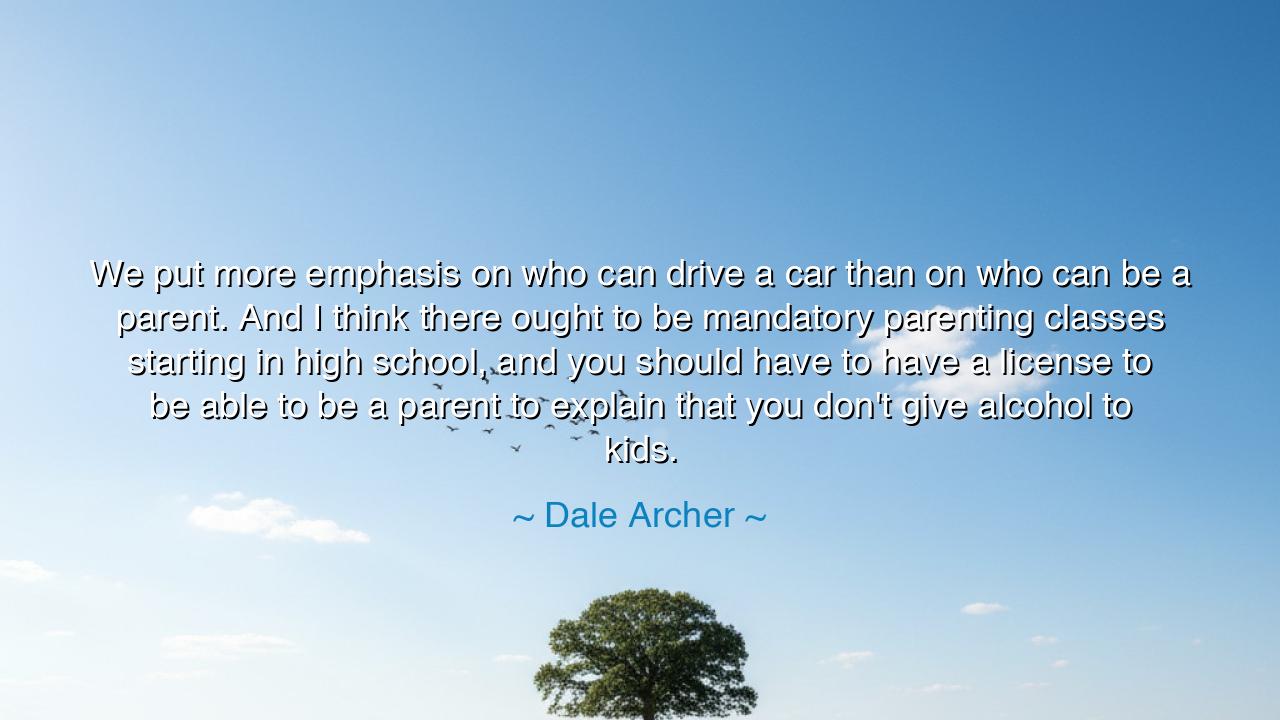
We put more emphasis on who can drive a car than on who can be a
We put more emphasis on who can drive a car than on who can be a parent. And I think there ought to be mandatory parenting classes starting in high school, and you should have to have a license to be able to be a parent to explain that you don't give alcohol to kids.






Dale Archer, physician and thinker, once spoke words that pierce with uncomfortable truth: “We put more emphasis on who can drive a car than on who can be a parent. And I think there ought to be mandatory parenting classes starting in high school, and you should have to have a license to be able to be a parent to explain that you don’t give alcohol to kids.” In these words, he does not mock but warns, revealing how society has inverted its priorities. For we train our young in machines of steel, but leave them untrained in the sacred art of shaping human souls.
The meaning is clear: the world insists upon preparation for tasks of lesser weight while neglecting the task of greatest importance. To drive without training is dangerous; but to parent without wisdom can scar generations. Archer’s words point to the paradox: society demands strict standards to protect life upon the road, but entrusts the future of children—the foundation of civilization itself—to chance, instinct, or guesswork. Thus, he calls for intentional training, for the art of parenting to be treated not as an accident of nature, but as a responsibility worthy of guidance.
History offers powerful examples of this truth. In Sparta, the raising of children was considered too important to be left entirely to chance. Young boys were trained in the agoge, and young women in discipline and strength, for the state believed the shaping of youth was the shaping of the nation. While some of their methods were harsh, their conviction was unshakable: the future depends upon the raising of the next generation. Archer’s call is not to mimic Sparta’s severity, but to remember their seriousness—that to raise a child is to mold the destiny of a people.
The mention of alcohol reveals another layer. For too often, parents, either from ignorance or negligence, endanger their children not only with substances but with unhealthy habits, broken examples, or lack of boundaries. A license, Archer suggests, would force society to affirm at least the simplest truths: that children need safety, discipline, and love. While his suggestion may be partly symbolic, its wisdom is sharp: we must stop treating parenting as an instinctual act requiring no preparation, and start seeing it as the most sacred of vocations.
What Archer presses us to see is that parenting is not simply a private matter, but a public one. A neglected child does not only wound their own home; they become a wound to society, carrying pain into schools, workplaces, and communities. Thus, the training of parents is not for the benefit of families alone, but for the health of nations. The child raised with wisdom is a blessing to many; the child raised without guidance is a burden upon all.
The lesson for future generations is that parenting must be pursued with humility, discipline, and preparation. We would not place an untrained pilot at the helm of an airplane, nor should we entrust unprepared parents with the future of a child’s life. Begin training early. Teach adolescents not only the skills of work, but the skills of love, responsibility, and care. Let schools speak of empathy, discipline, and the dignity of children, alongside mathematics and history. For these lessons may one day determine whether a generation flourishes or falls.
Therefore, take Archer’s words as both warning and summons: do not underestimate the task of raising a child. Seek wisdom before the cradle, not after. Learn patience, learn self-mastery, learn the sacred responsibility of guiding a soul. For when you step into the role of parent, you are not merely raising a child—you are shaping the future of humanity.
And so the teaching endures: treat parenthood as the highest calling, worthy of training, worthy of reverence, worthy of preparation. For those who prepare shall plant seeds of strength and goodness, and those who neglect shall reap sorrow. Let the wise choose the former path, that generations yet unborn may walk in light.






AAdministratorAdministrator
Welcome, honored guests. Please leave a comment, we will respond soon